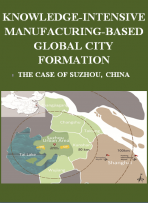Knowledge-intensive manufacturing-based global city formation: The case of Suzhou, China
Global cities (or world cities) have been a research focus over the last three decades since Friedman (1982, 1986)’s seminal research. The global city literature has acknowledged the manifest role of global cities that have worldwide command-and-control functions. High-level service sectors, represented by financial institutions and producer services, were recognised as a main driving force to form the global city. This study argues that advanced-manufacturing industry triggers the emergence of the global city that used to be less significant globally, using Suzhou as an example. By virtue of technological advancement and global knowledge transfer, centres for knowledge-intensive manufacturing have gained global significance. In Suzhou, the emphasis on manufacturing was encouraged by the government and also Multinational enterprises (MNEs) in manufacturing sectors involved actively for their business operation. Due to the nature of knowledge-intensiveness, there was a massive inflow of highly educated professionals, engineers, and managers into Suzhou, channelled via MNEs. Although presence of producer services is not as obvious as top-tier global cities, the economic size is growing rapidly; a global connectivity is growing in size and scope; and inflows of foreign nationals accompanied by expatriate managers are becoming crucial in Suzhou.
This research has conducted interviews with foreign (invested) firms in Suzhou for in-depth analysis. Also, this study relies on statistical data about economic strengths, demographic features, and foreign invested firms. Research findings provide evidence that Suzhou is transforming into one of the Asian global cities, associated with foreign business operations such as Korean, Taiwanese, Japanese, and American MNEs.
Tài liệu được định dạng file PDF(.pdf)
Xem chi tiết tài liệu trong phần Nội dung tóm tắt:
